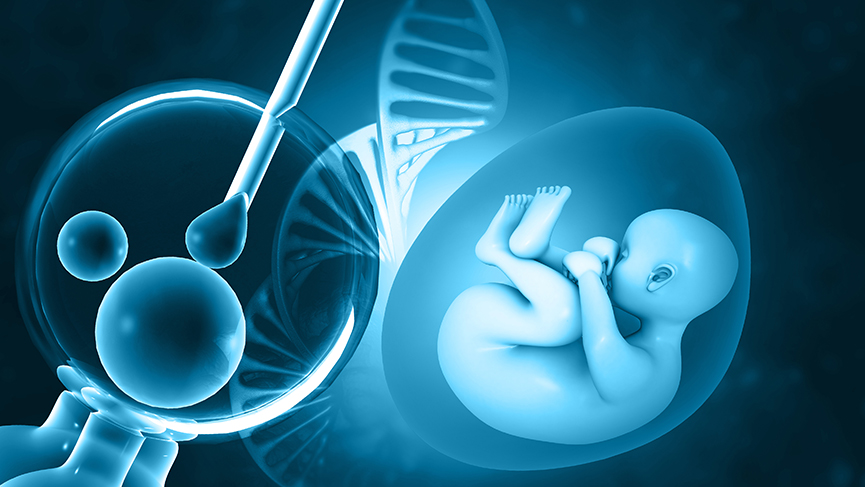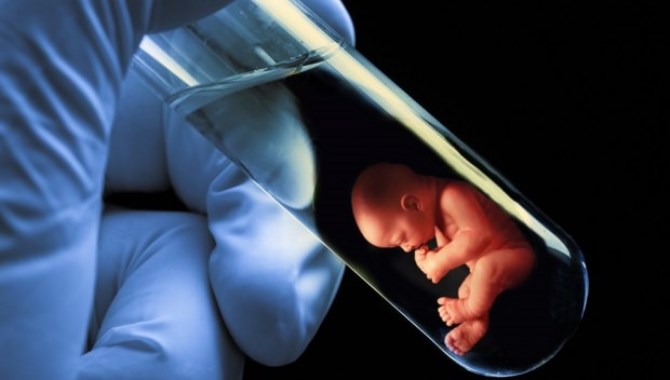IVF
What is IVF Treatment?
In vitro fertilization (IVF) is a long-term assisted reproductive technique applied to infertile couples. “In vitro fertilization” is one of the most preferred infertility treatments today.
Couples can have a baby with the in vitro fertilization method in cases where the cause is unexplained, or because of an infection, clogging of the tubes, poor sperm quality, weight or advanced age.
In vitro fertilization treatment includes the treatment process that ensures fertilization by collecting eggs, which are female reproductive cells, and sperm, which are male reproductive cells, and bringing them together outside the body in a laboratory environment.

While the fertilized eggs begin to divide and pass the first developmental stages called embryos in the laboratory environment, they are placed in the womb of the expectant mother.
Pregnancy obtained after this stage is no different from naturally occurring pregnancies. The difference from natural pregnancy is that the fertilization process is carried out under laboratory conditions and the fertilized eggs are placed back in the mother's womb.
Vaccination treatment can also be preferred before IVF treatment, especially in male infertility. In this method, the collected sperm are transferred into the uterus.
The process of placing the eggs in IVF is done in two ways:
• Fertilization in the laboratory environment is either by leaving the sperm next to the eggs and waiting for these sperm to enter the egg on their own and perform the fertilization process (classical IVF).
• Fertilization is by injecting the sperm directly into the egg with the help of a pipette under the microscope (microinjection).
In vitro fertilization specialists determine the choice between the two methods according to the characteristics of the couples. The goal is to get the highest chance of success for the couple.
What is the Difference Between Intrauterine Insemination (IUI) Treatment and IVF?
Especially in cases of male-related and unexplained infertility, IUI comes first among the preferred treatments before IVF treatment.
In IUI, as in in vitro fertilization treatment, the ovaries of the woman are stimulated, and after the eggs are cracked, the sperm taken from the man is transferred into the uterus with a cannula. At least one of the woman's tubes must be open in order for IUI to be applied.
The male's sperm analysis results should be normal or close to normal. In addition, the woman should not have an endometrial pathology (endometriosis disease) that will prevent the pregnancy from advancing.

What Does the IVF Treatment Process Cover?
Regularly menstruating women produce a single egg each month. In IVF treatment, it is aimed to increase this number with externally given hormone drugs.
Although each treatment protocol differs, basically two parallel hormone treatments are applied that provide egg development and prevent early ovulation.
During the use of these hormone drugs, ultrasound and blood tests are performed to follow the response of the ovaries, that is, to follow the egg development and to make dose adjustments when necessary.
Eggs that reach maturity in this way are collected with a simple needle injection method known as egg cracking needle, and they are fertilized with sperms taken from the male in the laboratory environment.
Egg collection can be done under general anesthesia as well as under sedation and local anesthesia.
This fertilization process can be achieved by placing the sperm and eggs side by side in the classical IVF method, or by injecting each sperm into a single egg under a high-magnification microscope, called micro-injection.
This fertilization process can be achieved by placing the sperm and eggs side by side in the classical IVF method, or by injecting each sperm into a single egg under a high-magnification microscope, called micro-injection.
Your doctor will explain which method is more suitable for you. The fertilized eggs are left to develop for 2 to 3 days or in some cases for 5 to 6 days in the laboratory in temperature and atmosphere controlled culture environments, and at the end of this period, the best developing embryos are selected and placed back into the uterus. Since the determination of the number of embryos to be transferred will directly affect the chance of pregnancy and the risk of multiple pregnancy, this number will be discussed with you in detail before the transfer, following the determination of the embryo quality. Embryo transfer does not require anesthesia and sedation, except in very rare cases.
In which cases is IVF treatment performed?
If it is not possible to get pregnant for 1 year or more despite having sexual intercourse without using any contraceptive method, an IVF Center should be consulted for infertility.
Until what age can IVF treatment be applied? What is the age limit for IVF?
In IVF treatment, the ovarian reserves of the woman are evaluated first. On the 3rd day of menstruation, the status of the ovarian reserve is checked with hormone tests and ultrasonography.
If the ovarian reserve is found to be good in this examination, IVF treatment can be performed until the age of 45.
However, due to the negative effects of aging, the embryo should be examined in terms of chromosomes. In addition, women who will start IVF treatment after the age of 38 should apply for preimplantation genetic diagnosis and evaluate the condition of their embryos.
The number of eggs decreases, ovulation is disrupted and the quality of the egg deteriorates in the women after the age of 35.
Even if ovarian reserves are suitable for IVF, the chance of success in IVF is also reduced.
For these reasons, it is important for women with infertility problems to start treatment without waiting for their advanced ages so that they can have children.
For a woman who is older and has a problem in the ovarian chamber, there is no method for pregnancy in IVF treatment. In our country, women who want to have children at an advanced age and have low ovarian reserve can become pregnant at an advanced age with egg freezing.
Pregnancies over the age of 35 fall into the high-risk pregnancy class and should be followed up by perinatology specialists.

Is there an age limit for IVF for men?
Erkeğin sperm üretimi her yaşta devam etmektedir. Ancak yaşın ilerlemesiyle birlikte sperm kalitesinde düşüş gerçekleşir. 55 yaş üzerindeki erkeklerde sperm hareketliliği yüzde 54 azalabilir. Bunda etken olarak yaş olarak sperm DNA’sının bozulduğu düşünülmektedir.
Who needs IVF treatment?
If pregnancy is not achieved within one year despite having regular unprotected sexual intercourse, a center should be consulted for the treatment of infertility and assisted reproductive techniques.
You can contact your doctor if:
• If you are planning to become pregnant and you are over 30 years old and have not had menstrual bleeding for an additional 6 months,
• If your menstrual periods are irregular or painful, if you have pelvic pain, endometriosis (such as a chocolate cyst) or recurrent miscarriages (2 or more miscarriages),
• If you have low sperm count, history of testicular and prostate diseases or sexual problems
Other situations in which IVF treatment is applied include:
1. In order for a pregnancy to occur naturally, the ovaries of the woman must be both open and functioning normally.
In vitro fertilization treatment should be applied if the female fallopian tubes, also known as ovarian ducts, are blocked, severely damaged or surgically removed.
2. In vitro fertilization treatment may also be required if there are adhesions around the female reproductive organs that will prevent the eggs developing in the ovaries from being caught by the fallopian tubes.
These intra-abdominal adhesions may be due either to previous surgeries in these regions (eg, ovarian cyst surgery, uterine fibroid removal, ectopic pregnancy surgery...) or to inflammatory conditions of the female internal genital system that have been noticed or not. In this case, as the first treatment step, these adhesions can be opened with laparoscopic surgery and it can be tried to ensure a normal tube-ovary relationship.
If this cannot be achieved or if there is no spontaneous pregnancy within a certain period of time after the surgery, in vitro fertilization treatment should be started.
3. In women with ovulation problems, in vitro fertilization treatment should be started if pregnancy is still not achieved despite the fact that ovulation is achieved with the drug treatment that provides ovulation. Women with polycystic ovary syndrome constitute an important part of this group.
4. If the woman has endometriosis, IVF treatment may be required. Endometriosis disease is the presence of the endometrium layer, which should normally be found in the uterus and is expelled during each menstrual period, outside the uterus, around the tubes, in the ovaries and on the intestine.
Endometriosis can prevent a woman from getting pregnant. If pregnancy is not achieved within a certain period of time following the surgical clearance of this disease, in vitro fertilization treatment is started.
5. In vitro fertilization treatment may be required if there is a disorder or insufficiency in the sperm count, sperm movement and sperm shape (sperm morphology) in the man. Today, in vitro fertilization / microinjection is the treatment method that gives the highest success and pregnancy rates in male-related infertility.
Early referral of couples with male-related infertility to IVF treatment increases the chances of success.
6. If no sperm cells are found in the sperm analysis in the man, the result can be reached with in vitro fertilization treatment. In this case, in vitro fertilization / microinjection treatment should be applied as the only treatment method, since sperm cells will be obtained from the epididymis or testis by surgical means.
7. In the presence of unexplained infertility, IVF treatment may be required. In vitro fertilization is also a suitable option in cases of unexplained infertility for couples who have attempted to have a child naturally and have not had any problems in their examinations. While these couples always have a chance of conceiving spontaneously, this chance gradually and significantly decreases as the years pass and the woman gets older.
In vitro fertilization treatment gives good results in these couples and removes the stress and tension on the couples in the shortest possible way.
8. If there is immunological infertility, in vitro fertilization / microinjection treatment can be done. If antibodies against sperm cells develop in the semen or in the female reproductive system and no result can be achieved with other treatments, in vitro fertilization should be considered as a treatment.
9. In case of advanced female age, IVF treatment should be considered. Fertility decreases with advancing age. This decrease accelerates especially after the age of 35. For this reason, starting IVF treatment without wasting time is an effective and fruitful approach, especially for women aged 38 and over who want to have a baby.
A waste of time that cannot be replaced with other infertility treatments means a high price for women of this age. In this period, which is racing against time, IVF treatment may be the best choice.
10. In cases where preimplantation genetic diagnosis is required, IVF treatment should be performed.
As a result;
The increase in success rates in IVF treatment has made this treatment a last resort option and placed it at the forefront of infertility treatments.
Taking IVF treatment to the forefront saves many couples the stress and strain of being childless for many years.

